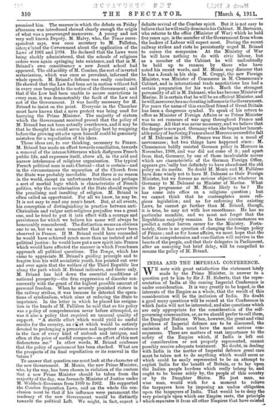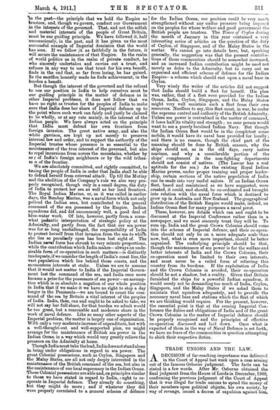INDIA AND THE IMPERIAL CONFERENCE.
WE note with great satisfaction the statement lately made by the Prime Minister, in answer to a question put to him by Sir J. H. Roberts, that the repre- sentation of India at the coming Imperial Conference is under consideration. It is very greatly to be hoped, in the interests of the Empire as a whole, that the result of this consideration will be the inclusion of India. No doubt a good many questions will be raised at the Conference in which India will not be interested, and also questions which are only appropriate for the consideration of the self- governing communities, or, as we should prefer to call them, the Daughter Nations. When, however, the great and vital problems of Imperial defence are to be discussed, the omission of India must have the most serious con- sequences. There are matters of vast importance to the safety of the Empire which, if India is left out of consideration or not properly represented, cannot possibly receive adequate treatment. No doubt, in dealing with India in the matter of Imperial defence great care must be taken not to do anything which would seem or which could be easily represented to be an attempt to exploit India for the benefit of Britain, or to lay upon the Indian people burdens which really belong to, and ought to be borne solely by, the people of this country or by its Daughter States. No just man, no wise man, would wish for a, moment to relieve the taxpayers here by imposing an undue obligation upon the taxpayers of India. That would be to deny the very principle upon which our Empire rests, the principle which separates it from all other Empires that have existed In the paat—the principle that we hold the Empire as trustees, and, though we govern, conduct our Government in the intlests of the governed. That, and not the selfish and material interests of the people of Great Britain, must be our guiding principle. We have followed it, half 'unconsciously, in the past, and it has given us the most successful example of Imperial dominion that the world has seen. If we follow ;it as faithfully in the future, it will secure the maintenance of that Empire. In the realm of world politics as in the realm of private conduct, he who sincerely undertakes and carries out a trust, and refuses in any way to use that trust for his own benefit, finds in the end that, so far from losing, he has gained. In the sacrifice honestly made he finds achievement, in the burden a benefit.
But though the interest of the governed and the refusal to use our position in India to help ourselves must be our guiding principle in the matter of defence as in other Imperial problems, it does not follow that we have no right as trustee for the peoples of India to make sure that India does her share of Imperial defence up to 'the point where such, work can fairly and justly be claimed to be wholly, or at any rate mainly, in the interest of the Indian people. We have always acted on the principle that India must defend her own frontiers from foreign invasion. The great native army, and also the white garrison, are kept up not merely to preserve internal law and order, and to support the authority of the Imperial trustee whose presence is so essential to the maintenance of the true interest of the governed, but also to repel incursions from across the mountains, whether by as y of India's foreign neighbours or by the wild tribes- iii in of the frontier.
We are absolutely committed, and rightly committed, to tasing the people of India in order that India, shall be able to defend herself from external attack. Up till the Mutiny and the abolition of the Company's rule we also very pro- perly recognised, though only in a small degree, the duty of India to protect her sea as well as her land frontiers. The Royal Indian Marine, or, as it was called in earlier days, the Bombay Marine, was a naval force which not only policed the Indian seas, but contributed to the general command of the sea possessed by the Empire. Indian squadrons did, and did uncommonly well, a good deal of blue-water work. Of late, however, partly from a some- what pedantic interpretation of strategic policy at the Admiralty, and partly from the fact that our sea power was for so long unchallenged, the responsibility of India to protect herself from that invasion from the sea to whiN she lies so peculiarly open has been lost sight of. The Indian naval force has shrunk to very minute proportions, while the contribution which India makes—always an unde- sirable form of co-operation in such matters—is distinctly inadequate, if we consider the length of India's coast line, the vast population which lies behind those coasts, and the momentous interests at stake. Unless we are to assume that it would not matter to India if the Imperial Govern- ment lost the command of the sea, and India once more became a prize for the possessors of sea power—an assump- tion which is so absolute a negation of our whole position in India that if we make it we have no right to stop a day longer in the Peninsula—we are bound to count the com- mand of the sea by Britain a vital interest of the peoples of India. India, then, can and ought to be asked to take, we will not say her full share, for that burden we admit would be too great, but a reasonable and moderate share in the work of naval defence. Like so many other aspects of the Imperial problem, the matter is largely one of organisation. With only a very moderate increase of expenditure, but with a well-thought-out and well-supported plan, we might arrange for the maintenance of British sea power in the Indian Ocean in a way which would very greatly relieve the pressure on the Admiralty at home. Though India must take the lead, India does not stand alone in being under obligations in regard to sea power. The great Colonial possessions, such as Ceylon, Singapore and the Malay States, are all not only deeply interested in the maintenance of the British command of the sea, but also in the maintenance of our local supremacy in the Indian Ocean. These Colonial possessions are able and, on principles similar to those we have stated in regard to India, uight to co- operate in Imperial defence. They already do something, • but they might do more ; and if whatever they did were properly correlated to a general scheme of defence for the Indian Ocean, our position could be very much strengthened without any undue pressure being imposed on the peoples for whose welfare and good government the British people are trustees. The Times of Ceylon during the month of January in this year contained a very interesting series of articles on the question of the duty of Ceylon, of Singapore, and of the Malay States in the matter. We cannot go into details here, but, speaking generally, the suggestion was that the present contribu- tions of those communities should be somewhat increased, and an increased Indian contribution might be used not merely as doles to the Admiralty, but to carry out an organised and efficient scheme of defence for the Indian Empire--a scheme which should rest upon a naval base in Ceylon.
Very wisely the writer of the articles did not suggest that India should build a fleet for herself. His plan was, rather, that if a fleet were provided for the Indian Ocean, India, Ceylon, Singapore, and the Malay States might very well maintain such a fleet from their own resources. Needless to say, this fleet must, in war, be under the supreme control and authority of the British Admiralty. Unless sea power is centralised in the matter of command, it loses half its vitality and strength ; no sane person would want to see a purely localised Indian Navy. But though the Indian Ocean fleet would be in the completest sense mobile, it would have its naval base provided for locally ; and there is no reason, though the chief part of the manning should be done by British seamen, why the ships should not, as in the old days, carry native marines, and why a considerable portion of the ships' complement in the non-fighting departments should not consist of natives. (The Lascar has a real aptitude for the sea.) As the existing Royal Indian Marine proves, under proper training and proper leader- ship, certain sections of the native population of India can be made into very useful sailors. If an Indian Ocean fleet, based and maintained as we have suggested, were created, it could, and should, be co-ordinated and brought into relation with the naval force which is destined to grow up in Australia and New Zealand. The geographical distribution of the British Empire would make, indeed, an Indian Ocean fleet for many purposes a naval pivot. These, however, are details which can and ought to be discussed. at the Imperial Conference rather than in a newspaper, and we most sincerely trust they will be. To sum up, India and the great Crown Colonies should come into the scheme of Imperial defence, and their co-opera- tion should not only be on a more adequate scale than now, but, what is even more important, should be better organised. The underlying principle should be that, though the maintenance of sea power is for the welfare and better interests of India and the Crown Colonies, their co-operation must be limited to their own interests, and must never be a veiled form of relieving this country from its burdens. If the exploitation of India and the Crown Colonies is avoided, their co-operation should be not a shadow, but a reality. Given that Britain furnished the ships for a powerful Indian squadron, it would surely not be demanding too much of India, Ceylon, Singapore, and the Malay States if we asked them to maintain that squadron adequately, and to provide the necessary naval base and stations which the fleet of which we are thinking would require. For the present, however, the essential point is that at the coming Imperial Con- ference the duties and obligations of India and of the great Crown Colonies in the matter of Imperial defence should be properly recognised and the principles of effective co-operation discussed and laid down. Once what is expected of them in the way of Naval Defence is set forth, we have no fears of the communities in question attempting to shirk their respective duties.











































 Previous page
Previous page